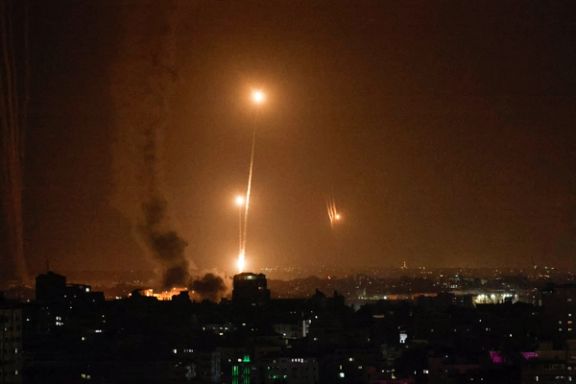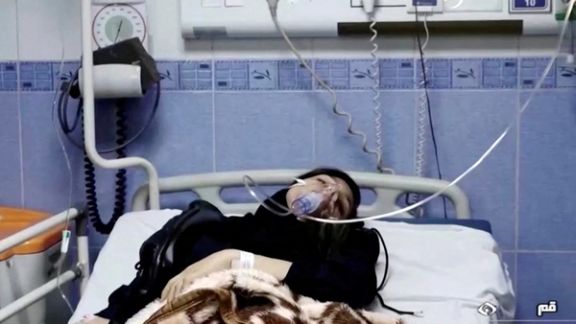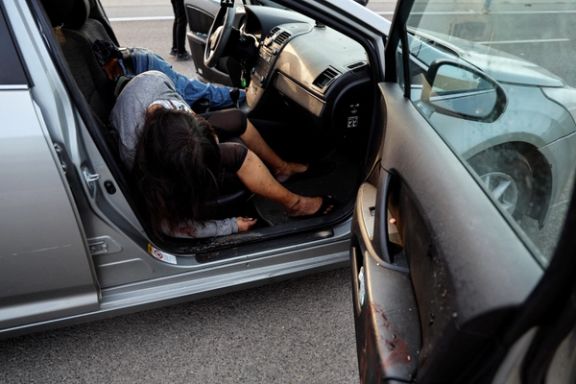Global Leaders Salute Narges Mohammadi For Nobel Peace Prize

World leaders and prominent political have figures extended their congratulations to Narges Mohammadi, the imprisoned Iranian activist, for her Nobel Peace Prize win.

World leaders and prominent political have figures extended their congratulations to Narges Mohammadi, the imprisoned Iranian activist, for her Nobel Peace Prize win.
Former US President Barack Obama also conveyed his congratulations, highlighting Mohammadi's decades-long advocacy for the rights of women and girls in Iran. Obama's message on X read, "For decades, Narges Mohammadi has been a vocal advocate for women and girls in Iran.
This Nobel Prize is a well-deserved recognition of her courage, and the hope that she represents—not only for the women in Iran, but for women fighting repression and violence around the world."
French President Emmanuel Macron expressed his admiration in a message, stating, “Her fight against the oppression of women in Iran and for human rights is essential and universal.”
The European Union released a statement in which they celebrated the Nobel Peace Prize awarded to Mohammadi, underscoring her unwavering dedication to upholding human dignity and the rights of Iranians, even from behind bars.
Penny Wong, Australia's Foreign Minister, applauded Narges Mohammadi's achievement and called for her immediate release, stating, "You have shown incredible courage in your fight against the oppression of women and girls in Iran."
In a separate development, over 320 Iranian political and cultural figures offered their congratulations to Mohammadi. They emphasized that opportunities like this, within the ongoing Women, Life, Freedom movement, will further reinforce the message of non-violence for women in society and all Iranians protesting against authoritarianism.
Political prisoners in the women's ward of Evin Prison also penned a letter, characterizing the the 2023 Nobel Peace Prize for Mohammadi as "a testament to her years of tireless work in advancing freedom and equality."

Iran's clerical regime is openly supporting the horror which has seen over 1,000 Israelis wounded and up to 150 dead in less than one day in a huge terror attack.
In a press briefing on Saturday evening, Israeli Defense Forces spokesman Richard Hecht was clear that the blame for the bloody and barbaric barrage in which even women and children have been taken hostage, lies with the Iranian regime, which has long been a supporter of the Gaza-based group.
“Iran has tentacles everywhere” he said when asked if the Iranian regime was considered the root cause of the attacks which over Saturday have so far seen an estimated 150 Israeli deaths, possibly dozens of civilians taken hostage and hundreds more wounded. The IDF refrained from sharing numbers.
Last year in an interview with Al Jazeera, Hamas chief Ismail Haniyeh publicly thanked Tehran for supporting it with $70 million to help it develop missiles and defense systems, saying the regime is the terror group’s biggest donor.
While Hamas - designated as a terrorist group by countries including the UK and US - announced they had launched more than 5,000 rockets, the IDF claim the number is closer to 3,000 but attacks continued into Saturday evening.
From 6am on Saturday, dozens of militants, many armed with RPGs, entered the country by land, sea and air attacking civilians in their homes, and invading military bases near the border.

Horrific images shared by Hamas on Telegram show civilians and soldiers being taken hostage, murdered and dragged through the streets of Gaza to baying crowds.
Members of Iran’s parliament were shown on state television rising from their seats to chant "death to Israel” as bells of celebration rang in Tehran.
Iran's foreign ministry spokesperson Nasser Kanaani was also quoted by ISNA supporting the terror proxy: "In this operation, the element of surprise and other combined methods were used, which show the Palestinian people's confidence in the face of the occupiers.”
Iranian state media reported celebrations in Tehran including fireworks and street parties on Saturday evening. The mural at Tehran’s Palestine Square was also changed in support of the militia’s operation.
Yahya Rahim Safavi, an adviser to Iran's Supreme Leader Ali Khamenei voiced unequivocal support for the terror proxy on Saturday, saying ”We will stand by the Palestinian fighters until the liberation of Palestine and Jerusalem.”
The IDF claims it is “ready for a long long event” after Hamas declared war in an attack on civilians like nothing witnessed in the country’s history. An aggressive deployment of troops has followed, and the response is as yet being discussed, though the IDF says it will be “severe” given the terrorist nature of the attack which has even seen children and elderly taken hostage both in their homes in Israel and smuggled across the border bank to Gaza.
Coinciding with the 50-year anniversary of the Yom Kippur war, in which Israel was invaded in a multi-front attack in the worst war in its history, Hecht said while the unraveling events should not be compared to the war which saw Israel attacked from multiple Arab nations, Saturday’s is “a bad bad event”.
Fears are that the offensive will become a multi-front attack as was seen earlier this year with rockets launched from Iran’s proxies in Lebanon, Syria and Gaza. Just last month, the leaders of Iran’s Palestinian proxies, Hamas, Palestinian Islamic Jihad and and the Popular Front for the Liberation of Palestine, met with the Supreme Leader in Tehran, showing an increasing unity forming between the groups as the regime rallies them to action against its archenemy.
Fellow Iran-backed proxy, Hezbollah, issued a statement in support of the invasion, which also included drones, the regime’s speciality weapon, claiming it was in direct contact with Hamas and other proxy groups.
In its statement, Hezbollah claimed the attacks were a "decisive response to Israel's continued occupation and a message to those seeking normalization with Israel", in a barbed attack on Saudi Arabia, whose relations have been ramping up in recent weeks amid talk of a US-brokered deal.
Israel is “prepared for an escalation in the north”, said Hecht, who also admitted that the country is braced for a long battle as Hamas has “a massive amount of missiles”, calling it “early days” with hundreds of militants involved, funded by Tehran.
The US was quick to show its support of Israel. President Joe Biden spoke with Prime Minister Benjamin Netanyahu, telling him he supports the Jewish state’s right to defend itself, while US Defense Secretary Lloyd Austin spoke with Defense Minister Yoav Gallant.
Austin said of the attacks which fell on both the holy Sabbath and the Jewish festival of Simchat Torah: "Over the coming days the Department of Defense will work to ensure that Israel has what it needs to defend itself and protect civilians from indiscriminate violence and terrorism.”
However, the support will be met with questions after a deal to free US-Iranian hostages has just allowed the release of $6bn of frozen Iranian funds, which many argue will be reinvested into the regime’s military operations at home and abroad.
As of Saturday evening, fighting was ongoing in 22 locations, with large swathes of Israel in bomb shelters as the situation unfolds.

Just two weeks after the new school year began in Iran, more high school girls have been poisoned. This time, it happened in a girls' high school in west Tehran.
On Saturday, a video started circulating on social media, showing students from Ashura High School in the Sahr-e Qods district of Tehran rushing out of their school with worried parents, onlookers, and ambulances present.
The Hengaw Organization for Human Rights, a monitoring group, said many of the sick students had to be taken to hospitals urgently.
The poisonings have been happening mainly in girls' schools across Iran since last November. They began during Woman, Life, Freedom protests and have been going on until April 2023.
The first case was reported in the city of Qom, and then it spread across the country with many students ending up in hospitals, and at least one death.
Some believe regime hardliners or religious extremists might be behind the attacks. They might be doing it to punish girls who are speaking out against the regime during protests. Some even call these attacks "state terrorism."
The government, though, is trying to make it seem less serious, without pursuing the case or detaining any perpetrators. They say students get sick from stink bombs and pepper sprays, which some students use to disrupt classes.

Barely a day after she won the Nobel Peace Prize, imprisoned human rights activist Narges Mohammadi has been targeted by ultra-hardline media in Iran.
Mohammadi has been arrested and sentenced around a dozen times in the past decade or so. Still, she has been unrelenting in her fight for democracy and human rights in Iran. She was in prison when the Nobel committee announced her as winner on Friday.
On Saturday (first day of the week in Iran) ultra hardline dailies, including those affiliated with the IRGC, attacked Mohammadi in what seemed to be a concerted effort.
“Criminals Award a Separatist, pro-Sanction Iranian,” headlined the IRGC-affiliated Javan. The daily, Jam-e Jam, owned by the state broadcaster, was slightly subtler: “For Nobel, Against the nation.” Farhikhtegan, another morning paper firmly advocating the regime’s hardline stance, had even a shorter headline: “Nobel for Shamelessness.”
The attack-lines were, of course, not new.
The Islamic Republic and its mouthpieces have always tried to blame the ‘enemy’ for all the country’s ills. A constant in the narrative is the ‘sellout activist’ – who takes money and guidance from the West and acts against the interests of her own ‘people’.
Narges Mohammadi has spent the better part of the last decade in prison. In total, she’s been sentenced to 31 years in prison and 154 lashes. She hasn’t been able to see her children since 2015, when they migrated to France with their father, political activist and former political prisoner, Taghi Rahmani.
Speaking shortly after his wife was named the 2023 Nobel Laureate, Rahmani said the award had been given to her “as a symbol” of the Women Life Freedom movement.”
The Nobel Committee said it was awarding the Peace Prize to Mohammadi “for her fight against the oppression of women in Iran and her fight to promote human rights and freedom for all.”
The announcement was met by near universal glee, from the White House to the streets of Tehran. The regime, however, was quick to denounce the prize and offer its alternative reality.
“The worthiest symbol of world peace was Qassem Soleimani,” declared the Foreign Minister of the Islamic Republic, exhibiting once more the unbridgeable gulf between those who rule over and those who live in Iran.
Soleimani was a notorious military and intelligence operative who created and nursed various militant groups in the Middle East until he was killed in a US drone strike in 2020.
Mohammdi is only the second Iranian to win the Nobel Peace Prize. Human rights lawyer Shirin Ebadi won it exactly twenty years ago, in 2003. Ebadi founded the Defenders of Human Rights Centre in 2001. Mohammadi served as the Centre’s deputy head and spokesperson.
Ebadi was one of the first Iranian figures to congratulate Mohammadi: “She truly deserved this prize. She has dedicated his life to fighting for freedom, equality, and protecting human rights. And today… she is behind bars.”

The Iranian government has extended congratulations to the Hamas terror group for its recent attacks on Israel, which resembled a formal and large-scale terror raid.
Naser Kanaani, the spokesperson for the Ministry of Foreign Affairs of the Islamic Republic, stated that the "operations conducted today have marked a new chapter in the realm of resistance and armed actions against occupiers."
In 1984, Iran was designated as a State Sponsor of Terrorism, and it has since persisted in its backing of activities associated with terrorism. This support includes assistance to Hezbollah, Palestinian terrorist factions in Gaza, as well as multiple terrorist and militant organizations operating in Iraq, Syria, and Bahrain.
Kanaani said, "Today's events are consistent with the ongoing successes of the anti-Zionist resistance movement across various regions, including Syria, Lebanon, and the occupied territories."
Iranian officials commonly use the term "Zionist regime" when referring to Israel.
The Iranian regime has also displayed billboards in Tehran's Palestine Square expressing support for the attacks on Israel, with a rough translation of the billboard reading "Storm of Rockets."
Additionally, members affiliated with the Basij, an IRGC-linked militia organization, distributed sweets and juice in the streets and at the University of Qom to celebrate the attacks.
Such actions have taken place amid strong condemnation from world leaders regarding the terror attack, which resulted in the deaths of at least 100 Israeli civilians and the injury of hundreds more.
Meanwhile, Iran’s Islamic Propaganda Organization, has announced its plan to organize government-sponsored celebrations in the streets of Tehran and other Iranian cities.

Iranian regime officials, parliament and state media have expressed their support for Hamas' large-scale attack on Israel, killing scores of civilians.
During their open session on Saturday, members of the Iranian Parliament showed their support for the militant incursion into Israel by chanting slogans, such as, "Palestine Will Win, Israel Will Be Destroyed."
Yahya Rahim Safavi, the former commander of the Islamic Revolutionary Guard Corps and military advisor to Iran’s Supreme Leader Ali Khamenei, also voiced his support for the terror group’s attack. He pledged “solidarity with Palestinians until the liberation of Palestine and Jerusalem.”
According to semi-officials ISNA news agency, he extended congratulations to Hamas forces and asserted that Former IRGC Quds Force Commander "Qassem Soleimani is undoubtedly with the mujahideen." However, he did not elaborate on how Iran's support for Hamas would manifest itself in the ongoing military conflict with Israel.
Earlier in the week, Iran's Supreme Leader, Ali Khamenei, criticized countries normalizing relations with Israel, characterizing it as a risky endeavor. He asserted that " The position of the Islamic Republic is that countries that make the gamble of normalization with Israel will lose. They are betting on a losing horse."
Media outlets associated with the Iranian regime have also embraced the news of Hamas's attack on Israel. Tasnim News Agency, affiliated with the IRGC, described Hamas's operation as a "significant blow to Israel" and touched upon the extensive number of Israeli casualties.
Likewise, IRNA, the official state news agency of the Islamic Republic, characterized Hamas's attack as "comprehensive," "complex," and "surprising." IRNA also noted that Hamas utilized drones during the attack to target Israeli positions.
Iranian-backed Palestinian Hamas launched a coordinated and large attack on Israel on Saturday, resulting in the loss of at least 40 Israeli lives and leaving over 500 people injured so far.